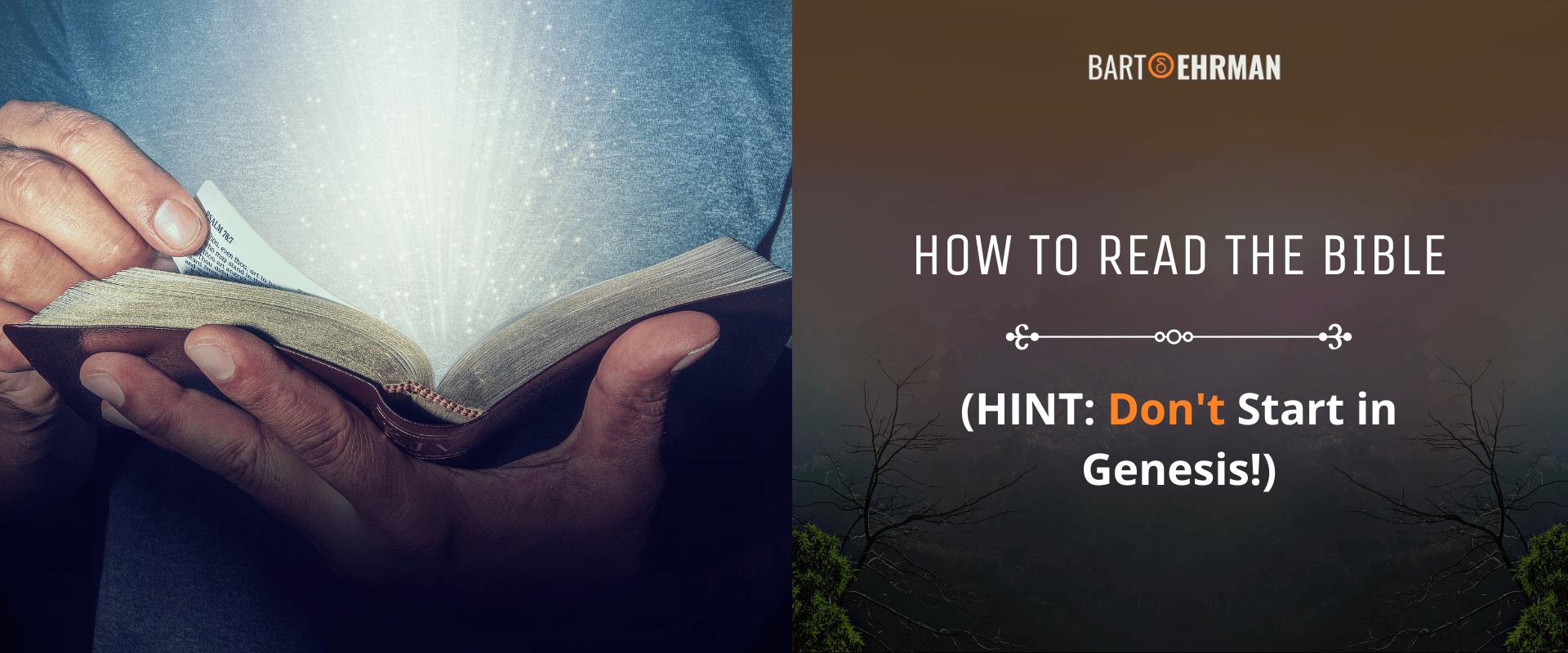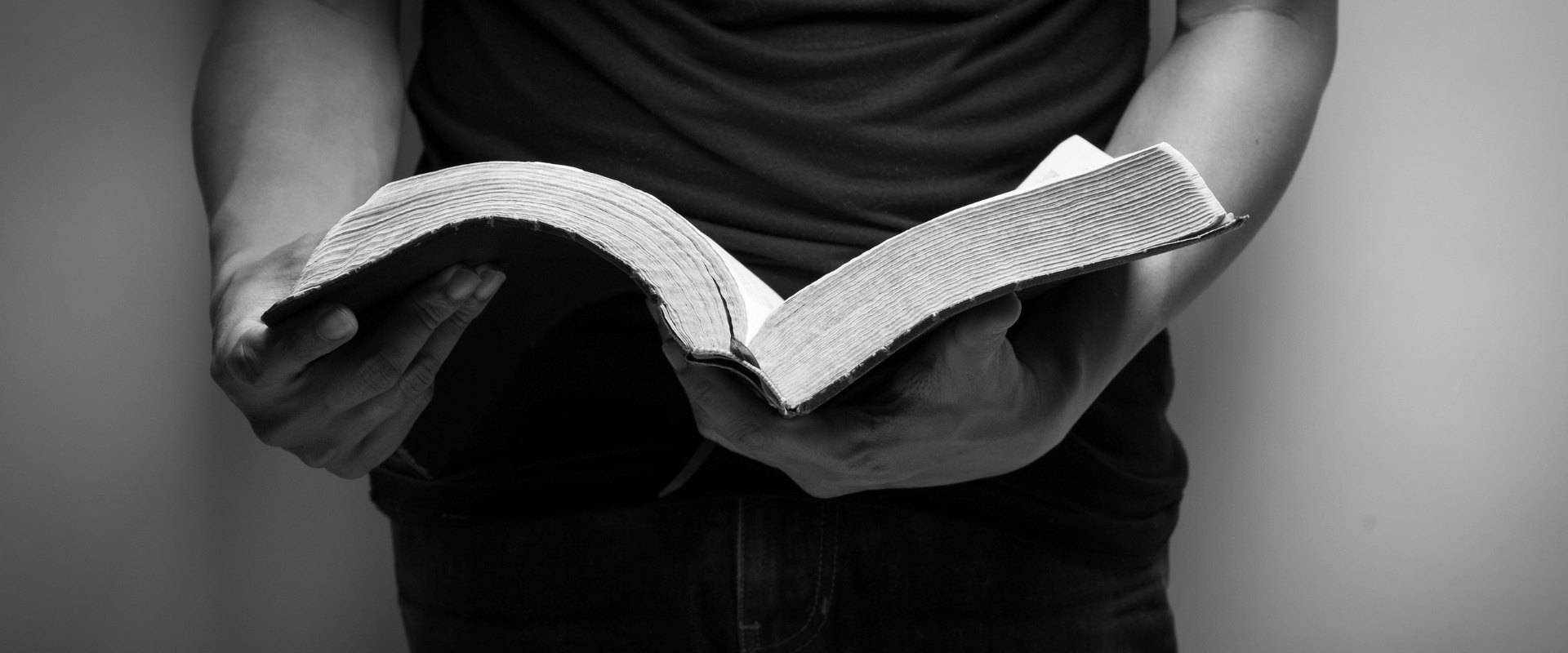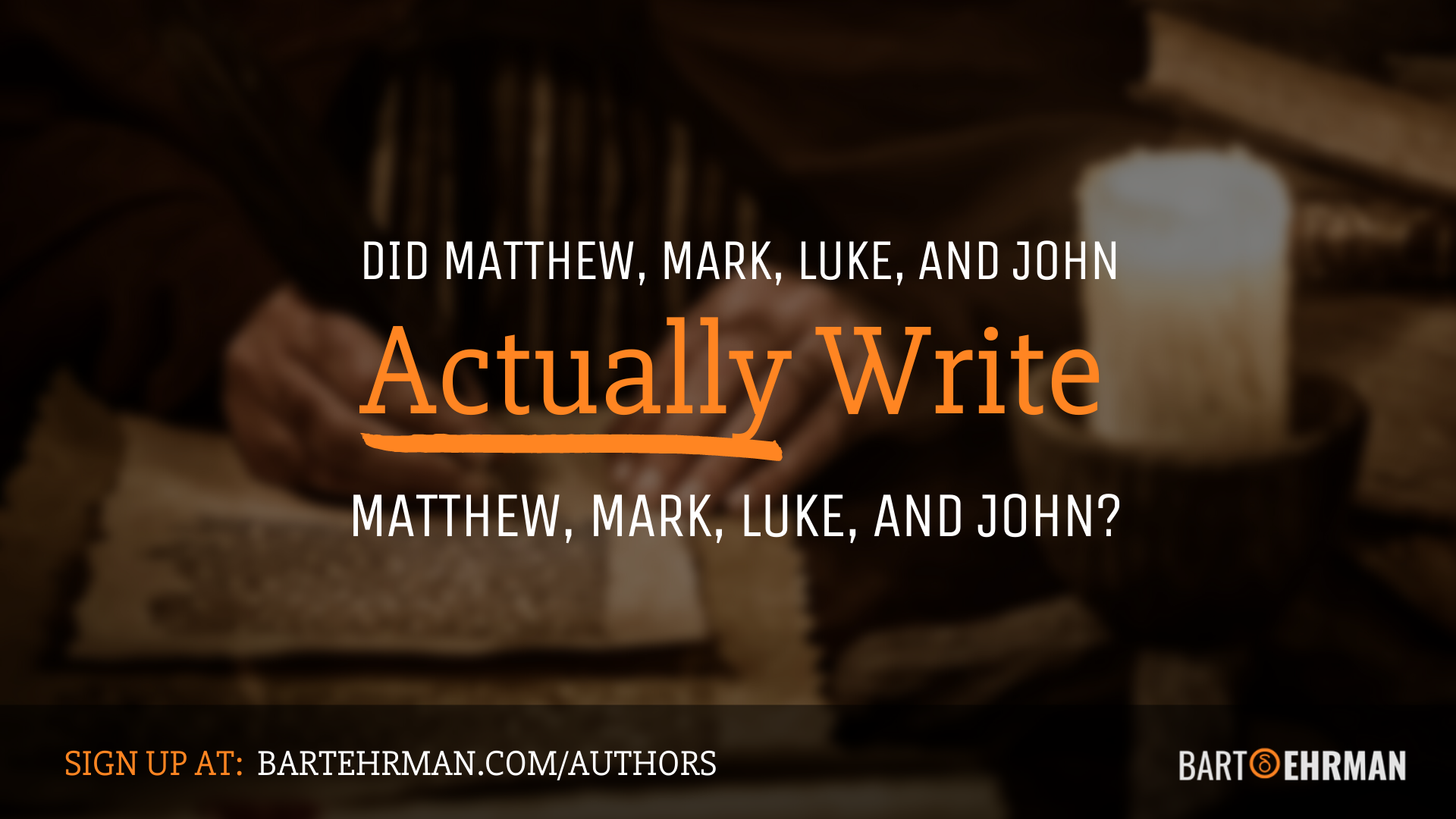How to Read the Bible (HINT: Don't Start in Genesis!)

Written by Joshua Schachterle, Ph.D
Author | Professor | Scholar
Author | Professor | BE Contributor
Verified! See our editorial guidelines
Verified! See our guidelines
Edited by Laura Robinson, Ph.D.
Date written: August 18th, 2024
Disclaimer: The views and opinions expressed in this article belong to the author and do not necessarily match my own. - Dr. Bart D. Ehrman
When I was 12 years old, I decided I would read the entire Bible from cover to cover. My conservative Evangelical family had taught me that all of life’s answers could be found there. Furthermore, our church constantly emphasized that the entire Bible — Old and New Testaments — was actually one complete story about how God had brought us salvation. I was already a big reader, so I took a deep breath and plunged into Genesis, the first book.
Unfortunately, no one had told me how to read the Bible. While I managed to get through Genesis and Exodus, I found Leviticus dull and hard to understand. It outlined rules that didn’t make much sense to me (and which my church disregarded). Completely overwhelmed, I quit my ambitious Bible reading project sometime during the aptly named book of Numbers.
Many years later, when I was in graduate school, I realized why reading the Bible had been so arduous for me. With this new information, I was then able to read and understand it much more easily. This article is about how to start reading the Bible for beginners. I’ll even suggest the order of books you might read, as well as resources you can use and questions you can ask of the text to make these ancient writings more comprehensible.

How to Read the Bible: Hermeneutics
Before detailing where to start reading the Bible, I’d like to start with some ideas about its interpretation. How something is interpreted, the “lens” you look through while reading, is called hermeneutics. While I’m not going to tell you to get a PhD and become a biblical scholar, I would like to mention how some of the work of biblical scholars can add to your hermeneutic.
Imagine that people from the year 1924 had somehow been able to time travel to the future and then returned to their own time with a novel from 2024. By reading it, they might understand most of the words but some — laptop, cellphone, internet — would be incomprehensible. They would be hopelessly confused unless they could somehow learn about our time and culture — our context. To understand what that book was truly saying, they would have to somehow learn about those words and their specific meanings in the culture of 2024.
I think this analogy applies equally well when reading ancient texts, including the Bible. In How to Read the Jewish Bible, Judaic Studies professor Marc Zvi Brettler notes that words can’t determine meaning by themselves. Rather, meaning is determined by understanding the context in which the words were written. Just like our time-traveling friends, we don’t live in the time or culture of the Biblical authors. Just reading translations of the words they wrote doesn’t necessarily tell us what those words or ideas meant to them. (Affiliate Disclaimer: We may earn commissions on products you purchase through this page at no additional cost to you. Thank you for supporting our site!)
In fact, Brettler notes that people have read and interpreted the Bible in many different ways at various times in history. Human beings tend to read their own situation and culture into texts, even if they were written in a completely different context from their own. What I am suggesting here is that learning about the time and culture in which the texts were originally written can help you understand what you read. By the way, scholars call this the historical-critical approach, although you don’t need to be a scholar to try it. Remember, I’m talking about how to start reading the Bible for beginners.
Anyone interested in learning how to read the Bible for any reason can benefit from this approach. Scholars will, of course, delve much more deeply than laypeople into the texts, but anyone can learn some of the basic information about the original context of each of the biblical texts. By the way, if you read the SBL Study Bible, each book begins with information for historical and social context, while helpful notes throughout the rest of the book talk about that context in specific instances. Highly recommended!
Another great resource is the Jewish Annotated New Testament in which scholars of the NT and Judaism give specifically Jewish contextual information for each book. Finally, check out the Bible Odyssey website. This is a free online resource created by the Society of Biblical Literature (SBL) for non-scholars which provides scholarly information about the Bible for people who don’t want to get a PhD. I think you’ll find it very useful for understanding the Bible in its original contexts.
The second piece of advice I’d like to give about how to view the Bible as you’re reading comes from New Testament scholar Bart Ehrman. He notes that because the Bible has long been considered one whole book rather than a disparate collection of texts, it’s usually assumed that all the writings go together and agree with each other.
With that hermeneutic, we often don’t see what is really there in the text itself, assuming instead that every text must generally say the same thing. However, Ehrman suggests that there is a better way to read the Bible:
The historical-critical approach to the Bible is different. It does not assume that each author has the same message of what the Christian faith is and should be… The discrepancies in the Bible [between books] are important, in part, because they force us to take each individual author seriously.
In other words, try taking each individual book of the Bible on its own terms. While some may view this approach as an attempt to discredit the Christian or Jewish faiths, I absolutely disagree. I think that religiously committed people can still read the Bible for spiritual inspiration while understanding each book far better in its original context. I think this will only add to what you get out of your Bible reading efforts.
Having established my argument for this approach, I’ll now give you suggestions for where to start reading the Bible. Since the Christian Bible consists of the Hebrew Bible/Old Testament and the New Testament, I’ll address those two separately.
Where to Start Reading the Bible: New Testament
In his book The Rise And Fall Of The Bible: The Unexpected History of an Accidental Book, scholar Timothy Beal writes that since the Bible is, in fact, a collection of books by many different authors in many different time periods with many differing perspectives, we ought to call it a library rather than a book.
I like this idea. As Beal points out, a library contains a collection of books by many different authors in many different time periods with many different perspectives, too. We don’t expect all the books in a library to have the same ideas or to necessarily agree with each other. In addition, since it has so much variety, most people never feel the need to read the entire library. We would never ask “What does the library say about __________?”
If we think of the Bible as a library, there is no need to read it cover to cover as if it were a novel. Rather, we can break it up in countless different ways, by individual books or by sections (or both!). For that reason, even though the Hebrew Bible/Old Testament was written long before the books of the New Testament, I’m going to suggest starting your reading in the New Testament with the Gospel of Mark.
Wait a minute, you might be saying. Doesn’t Matthew come first? Yes, in the biblical canon, Matthew’s placement is as the first Gospel and first book of the New Testament. However, scholars have known for a long time that the first written Gospel was Mark. Employing the historical-critical method, then, I suggest you start with Mark and then read the rest of the Gospels chronologically in the order they were written: Matthew, Luke, John.
Read each account of the life and death of Jesus, not harmonizing them with each other but instead looking for differences in how he is portrayed in each book. As Bart Ehrman says above, take each author seriously rather than making him part of a whole story. For each of the Gospel authors, their story was the whole story. Examine how Mark’s Jesus becomes the Son of God as an adult at his baptism, how Matthew and Luke’s Jesus is born as the Son of God, and how John’s Jesus has eternally been the Son of God.
Again, I suggest reading the SBL Study Bible, which will introduce each book by contextualizing its time and culture. Then, read at least some of the helpful notes accompanying the verses as you go. Think about how the contextual information adds to or changes their meaning.
Next, read the book of Acts. It was written by the same unknown author who wrote the Gospel of Luke and purports to be the story of the early Church. Later, when you read the letters of Paul, you can see if they agree with Acts’ portrayal of Paul.
Next, I recommend reading the letters of Paul. While there are 13 letters attributed to Paul in the New Testament, scholars have long known that he probably wrote only 7 of those. Start with those 7 and read them, like the Gospels, in the order they were written:
1 Thessalonians
Galatians
1 Corinthians
2 Corinthians
Philemon
Philippians
Romans
Again, read about the context of each letter provided by the SBL Study Bible or Bible Odyssey. Then pay attention to two things: First, what is the situation or occasion for which Paul wrote the letter? Was there a conflict? Was he writing to teach something? Second, what is Paul’s conception of who Jesus is and why he matters? Since Paul really did write all 7 of those letters, he remains remarkably consistent in his answers, although he addresses different concerns in each.
Next, read the letters attributed to Paul but (probably) not written by him. These are 2 Thessalonians, Colossians, Ephesians, 1 and 2 Timothy, and Titus. Since all of them were written after Paul’s death, the reading order is not as important. Pay attention to what the author of each letter tried to do in Paul’s name. Does the theology of the letter agree with any or all of Paul’s undisputed letters? How does it differ?
Next read Hebrews and the Catholic or General epistles:
James
1 Peter
2 Peter
1 John
2 John
3 John
Jude
How are these writers portraying their concerns about the development of the Church in the decades after the original apostles had passed on (none of the books were actually written by the apostles)? What is going on around them and in their communities as they write these letters?
Finally read the book of Revelation. Besides knowing that the author’s name was John and that it was written at the end of the 1st century CE, what can you tell about him from his writing? Take him seriously by understanding how his version of the Christian faith, deeply informed by Jewish apocalyptic literature, differs from that of Paul or the other New Testament writers.

Where to Start Reading the Bible: Hebrew Bible/Old Testament
The Old Testament, at 39 books, is much longer than the New Testament which has only 27. The thought of reading the entire Old Testament can thus be pretty daunting. Where to begin?
First, remember that we’re dealing with a library, a collection of varied texts from different times, places, and perspectives. In thinking about how to read the Bible for beginners, this is an important point. You don’t have to read it straight through like a novel. You can skip around. You might even want to start with an outside source covering the history of Israel written by a modern historian (Bible Odyssey is great for this, by the way). I like A Brief History of Ancient Israel by Victor Matthews but there are many other accessible books on this topic.
Having said that, I’m still going to suggest starting the OT with the book of Genesis. Why? Because as Marc Brettler points out, Genesis contains some of the foundational myths of the ancient Israelites. By “myth” I don’t mean something untrue, but rather a story explaining the origins of the traditions of a people, their gods and religious beliefs, heroes, and cultural traits. All ancient peoples had such myths, and Genesis collects many of these founding myths and helps explain some of what comes later in the OT. Incidentally, scholars know Genesis was written as a response to the Israelites being in exile and attempting to reform and solidify their identity.
Pay attention while you’re reading. Don’t skim the story of Adam and Eve because you’ve heard it a million times. Notice, for example, that there are two creation stories, the first in Genesis 1 and the second in Genesis 2 (I grew up reading the Bible and didn’t notice this until I was in graduate school!). Why would there be two? Could it be that they were written by two different authors (spoiler alert: yes)? Was the creature who tempted Eve Satan in the guise of a snake or just a snake? See what the text actually says rather than what you’ve been told.
Next, read Exodus, which contains more of the founding myths of ancient Israel. After learning about the context of its writing (again, in response to exile), read carefully what the text actually says. What information about Moses can you find that you had overlooked before?
Next, skip to Joshua, the often-violent story of how God granted the land of Canaan to Israel. What is the character of God in Joshua? Is God universal, as Christians assume him to be, or is he only on the side of Israel?
After reading Joshua, move ahead to Judges, 1 and 2 Kings, and 1 and 2 Chronicles. These are further stories about how Israel’s monarchy developed after starting with a government ruled by a cadre of judges.
Read the prophets next, including the major prophets:
Isaiah
Jeremiah
Lamentations
Ezekiel
Daniel
Then, read the minor prophets:
Hosea
Joel
Amos
Obadiah
Jonah
Micah
Nahum
Habakkuk
Zephaniah
Haggai
Zechariah
Malachi
Again, treat each prophetic book as a separate text. Don’t assume the prophets all agreed. What disagreements are there between these books about God’s relationship with Israel? Is he their caring Father or a harsh judge (or both)? Each book has its own perspective, so read carefully.
Next, read Psalms, a book of poetry and lamentations to God by an unknown author (or authors) who was long believed to be David. The vast majority of scholars no longer attribute authorship to him, but that doesn’t diminish the beauty or pathos of these heartfelt poems to and about God. Try to form a picture of God’s character according to what the poems describe.
The last book I’ll recommend is the book of Job. It is a fascinating read. Some of the oldest writings in the Hebrew Bible are within its chapters. And yet, its conception of God as a kind of divine puppet master who seems almost indifferent to human suffering is difficult to reconcile with the other, more loving depictions of God in other books. This is a good book to “wrestle” with theologically, as Jacob wrestles with God in Genesis.
I haven’t covered every OT book, but I think I’ve certainly suggested enough to get you started.
Conclusion
Embarking on a journey through the Bible can be both enriching and intimidating. As you approach this vast collection of texts, it’s crucial to remember that it’s not a singular narrative but a diverse library of writings from different authors, cultures, and historical periods. Understanding this diversity is key to unlocking the depth and complexity of its messages.
Remember, that learning how to read the Bible requires ongoing exploration due to the book’s complexity. Resources like the SBL Study Bible, the Jewish Annotated New Testament, and Bible Odyssey can offer valuable insights, but your personal engagement with the text is equally important. Approach each book with curiosity and openness.
FREE COURSE!
WHY I AM NOT A CHRISTIAN
Raw, honest, and enlightening. Bart's story of why he deconverted from the Christian faith.
Over 6,000 enrolled!

